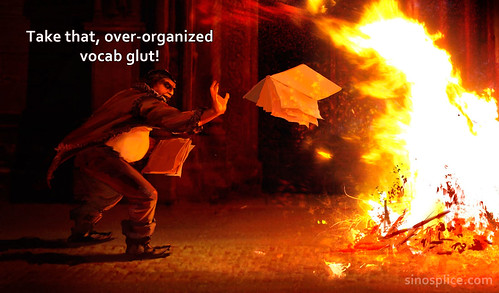Analysis Paralysis in Chinese Studies
You’ve probably heard of analysis paralysis, but where does it come into Chinese studies? Studying a language is fairly straightforward, right? I’m referring not to being overly analytical about grammar, but rather about vocabulary. How can one be overly analytical about vocabulary? This is something that technology has made easy in recent years.
Most of my AllSet Learning clients use Pleco or Anki to review vocabulary. Both have built-in SRS flashcard functionality, so doing occasional reviews pretty much solves that problem, right? Well, maybe… SRS drawbacks aside, certain personality types like to take a more active role in the vocabulary categorization process. Yes, categorization. That’s the trap.
You see, when you save a word to your flashcard system, you can also categorize it. Where did this vocabulary come from? What type of vocabulary is it? How high priority is it? You can go as deep down this rabbit hole as you want. And you can spend a lot more time organizing and re-organizing your flashcards than actually reviewing them.
So typically when a client comes to me with “flashcard organization problems,” the way forward is pretty clear: it’s time for some serious vocab axing. The situation can be as bad as physical packrat (or even hoarder) tendencies, except with vocabulary data instead of old newspapers or whatever. In most cases, the learner is much better off chucking the majority of this carefully collected information. Usually the most exquisitely categorized lexical items are the least useful. Reducing everything to one “high priority” list is the way to go. This really is all you need, and you get back all that time you used to waste endlessly organizing words (without actually learning them).
For those that are seriously attached to their accumulated lexical data, technology offers a solution: you can back it up! Back up the data, dump it somewhere, and keep your active word list as simple, focused, and clutter-free as possible. (Chances are you’ll never go looking for that backup.)
If this problem sounds vaguely familiar, you may be thinking of the bookshelf problem. It’s amazing, isn’t it, how we humans can be motivated to do something related to learning a language, but actually pour the majority of our efforts into useless activities? The worst, part, of course, is that even a meticulously curated collection of lists which are somehow regularly reviewed don’t guarantee any kind of conversational ability. But then actually talking to people is a bit too random for the analytical brain to handle.
The solution is simple, though: less organizing, more talking. A more bare-bones vocabulary list will help you move in that direction. If you’re a vocabulary hoarder, I strongly urge you to reconsider your approach.


Oh, a photo of a book-burning. How progressive.
Don’t worry, it’s only a digital representation from a video game. No books were harmed in the making of this blog post.
A valuable reminder, John. Now axing all the esoteric vocab from my Pleco cards!
Great post; I recently did something exactly like this with my Pleco cards — had so many obscure vocab words and Chengyu from reading clogging up studying what was important.
Good work. I’m sure it was well warranted.
For those living on the mainland, it is best to limit your use of SRS technology. The time should be spent find willing listeners who are happy to help out. The people are indeed your resource, not a smartphone or tablet. However I understand perfectly how the technology can act as a crutch as well as a security blanket; it gets to the point where your vocab or sentence lists are all you care about. What should be a focus is genuine communication in the target language – sure, this can be done with advanced non-natives, not jut Chinese nationals. During those sessions, you should be trying to sneak in your recently acquired vocab and steering the conversation towards it, attempting to repeat the vocab as much as you can in natural conversation (or what goes for natural conversation given your language ability in Chinese). When communicating be sure to take stock of what is working, the feedback you receive (in all its various forms) and your approach in creating your own learning moments. I really encourage you to limit the SRS time – this is purely a quality vs quantity thing.
Ha! This one made me LOL. I’ve never met anyone who confided in me about their vocabulary hoarding habit but I can just imagine the exquisitely complex schemes they might have for categorizing it.